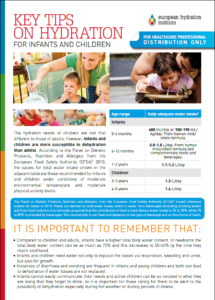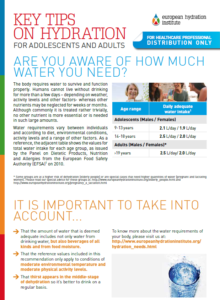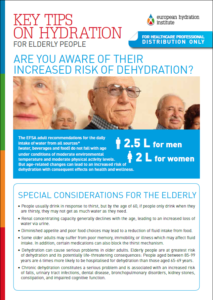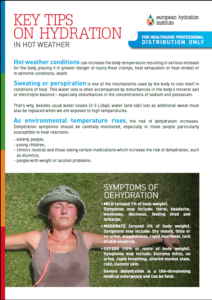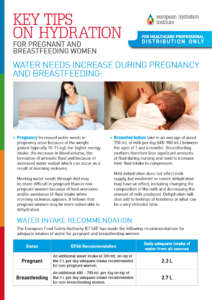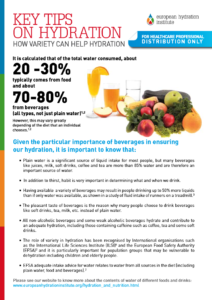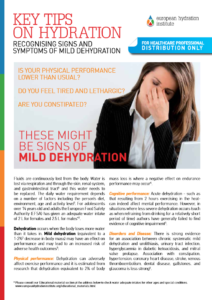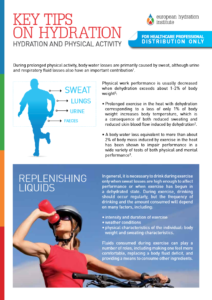Key Tips on Hydration
Hydration for infants and children
The hydration needs of infants and children are not that different to those of adults. However, they tend to be more susceptible to dehydration than adults are. In this new issue reference water intake values for infants and children are given, as well as practical tips to ensure proper hydration of infants and children.
Hydration for adolescents and adults
Water needs vary between individuals and according to diet, environmental conditions, activity levels and a range of other factors. This first issue of the collection focuses on the hydration needs of adults and children over 9 years of age under moderate environmental temperature and physical activity levels. Information about water sources to meet hydration needs is given along with hints and tips about staying hydrated. Special situations (such as during pregnancy and whilst breastfeeding) when additional water requirements may be needed will be covered in future issues.
Hydration for elderly people
Elderly people are at a greater risk of dehydration. In this new leaflet we provide an insight into the reasons why liquid intake is often diminished in the elderly and the consequences to health, wellness and performance. Practical tips to help keep elderly people well hydrated are given.
Hydration for hot weather
As environmental temperature rises, the risk of dehydration increases especially in those people particularly susceptible to heat reactions such as children, elderly people, people with reduced mobility, etc. In this new leaflet we provide information about symptoms of dehydration and practical tips to ensure proper hydration of the body under hot weather conditions.
Hydration for pregnant and breastfeeding women
During pregnancy and breastfeeding, an adequate hydration is essential for meeting the new water needs of the body and of the baby in the first case, and to ensure milk supply in the second one. In this new leaflet we provide information about additional water intakes recommendations for both situations and give practical advice to ensure proper hydration.
How variety can help hydration
Beverages in addition to plain water are of importance in ensuring proper hydration, but they can also provide us with other benefits. In this new leaflet we give you interesting facts about the role of different beverages in our hydration and in our health and performance.
Overhydration
Body water is tightly regulated to ensure we have just enough, and varies by no more than 1% daily in normal, healthy people (around 250-500ml). When body water decreases (e.g. due to sweating) or blood sodium levels rise, thirst is stimulated and the kidneys conserve fluid. Most people respond by drinking slightly more but, in a small number of cases, excessive fluid consumption can cause overhydration. In this new issue the effects of overhydration are reviewed, and practical tips to prevent it are provided.
Physical activity
Hydration is an important consideration when engaging in physical activity. During prolonged sessions, water is lost from the body mainly as sweat, and physical work performance is usually decreased when dehydration exceeds about 1-2% of body weight. In this new issue we present some data about how water losses may affect physical performance, and provide advice on how to be properly hydrated whilst being physically active.
